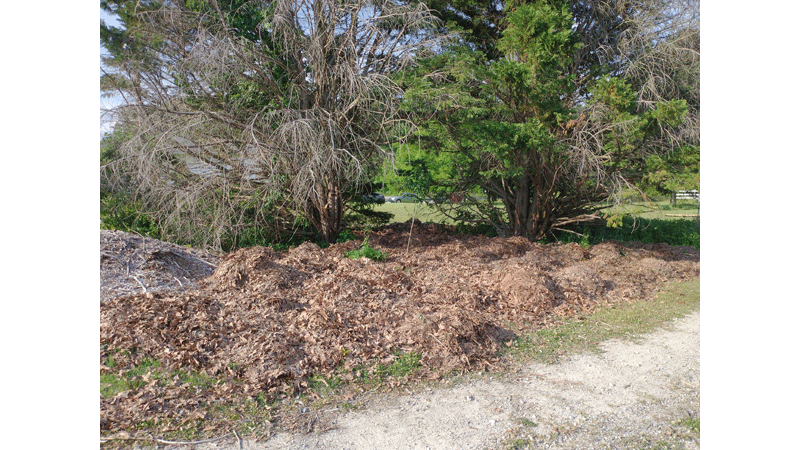Reuse, recycle excess materials in the garden, reduce waste
Published 12:23 pm Thursday, June 16, 2022

- Taking up a Smithfield resident on his offer of leaves he had bagged, Mark C. Carroll uses the leaves as leaf mulch around his evergreen trees to help fertilize and reduce weed pressure. (Photo submitted by Mark C. Carroll)
|
Getting your Trinity Audio player ready...
|
By Mark C. Carroll
Sometimes one person’s trash really is another’s treasure.
Recently a gentleman resident of Smithfield posted that he had many leaves bagged, and he hoped someone would want them instead of sending so many plastic bags to a landfill.
I noticed his post on social media and initially ignored it, hoping someone else might want them. Let’s face it — we all have demands on our time. After a second posting on another site, I decided I would help. The simple fact is, I have lots of space and mostly evergreen trees, so I thought putting some leaf mulch around them would help fertilize and reduce weed pressure.
Four truckloads later, and illustrated in the photo adjacent to this story, you can see their new home.
I guess in hindsight all that plastic will still be sent to the landfill, but at least the leaves will be put to use, and as importantly, I was able to help a neighbor remove an eyesore.
I thought, ‘What are some other ways we can turn waste into garden gold?’ Certainly, I could have kept the leaves bagged and added them to compost. Generally composting is one of the first things we might think of. Since many garden tasks leave us with cuttings and clippings, it is natural to want to make soil out of them. It seems like every gardener would have a small compost pile. Quick tip: If your compost pile stinks really bad, it needs more air, or you need to turn it. Aerobic compost does not typically smell like rotting garbage.
For the crafty types out there, some garden materials can be used in those activities. It starts with learning what you have an excess of. I learned that when I prune my muscadine vines, if I soak them in water in a large circular container, I can spin them around until I make a wreath and then dry it out.
I mentioned that I make charcoal for use in my garden. Just yesterday I stopped by a box store and asked about all the broken pallets behind their store. They retain unbroken pallets for return and reuse; however, they cannot return them broken. So, a truckload of pallets that are very dry burn into charcoal very well. It is not perfect as I have to separate the nails and any metal with a magnet, but it is free (except for my labor), and the garden won’t know the difference.
I believe that giving money and supporting large-scale activities could potentially improve our environment. However, I am certain that at the individual level, caring for our planet by recycling and repurposing what would otherwise be waste is being proactive and within an individual’s circle of influence. The more gardeners adopt these practices, the better our environment and the more success we have in our gardens.





